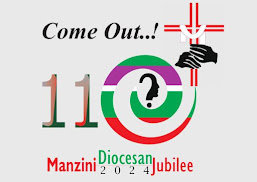During May I was asked to address members of the "Swaziland Council of Catholic Women" (SCCW) on “The Spiritual and Social approaches of the church to the suffering of the world”.
Preparing for the talk I remembered a story Bishop Barry Wood OMI used to tell us. Barry was the auxiliary bishop of Durban and a good friend. He died a year ago. We used to sit down next to each other at the bishops' meeting.
I shared the story with them in two moments like I do here adding also part of my comments on that day.
“Once upon a time, there was a town that was built just beyond the bend of a large river. One day some of the children from the town were playing beside the river when they noticed three bodies floating in the water. They ran for help and the townsfolk quickly pulled the bodies out of the river.
One body was dead so they buried it. One was alive, but quite ill, so they put that person into the hospital. The third turned out to be a healthy child, who then they placed with a family who cared for it and who took it to school.
From that day on, every day a number of bodies came floating down the river and, every day, the good people of the town would pull them out and tend to them – taking the sick to hospitals, placing the children with families, and burying those who were dead.
This went on for years; each day brought its quota of bodies, and the townsfolk not only came to expect a number of bodies each day but also worked at developing more elaborate systems for picking them out of the river and tending to them. Some of the townsfolk became quite generous in tending to these bodies and a few extraordinary ones even gave up their jobs so that they could tend to this concern full-time. And the town itself felt a certain healthy pride in its generosity.”
This story – which does not end there – is a good parable of our Church. In the book of Exodus (3: 6 - 7) God tells Moses: “I have seen how cruelly my people are being treated in Egypt; I have heard them cry out to be rescued from their slave-drivers. I know all about their sufferings, and so I have come down to rescue them..." We too, as a church, "see - hear - come down".
Just think of some of the initiatives the Catholic Church in Swaziland is running:
- Care for
- orphans (school fees, two-roomed houses, food, clothes...)
- refugees at the refugee camp
- teenage girls donating sanitary pads
- the sick through a hospital, clinics, visit to the sick, parish nurses, healing services and a hospice
- poor through St Vincent de Paul and Caritas in our parishes and diocesan office
- those affected by drought through the provision of water tanks
- Fight against
- human trafficking
- Gender based violence
I could go on and on and people in our parishes can add others to these ones.
These projects did not start this year. Like the ones in the story, our Church too has been caring for the most vulnerable ones for a long time and year after year we strive to improve our service.
“However, during all these years and despite all that generosity and effort, nobody thought to go up the river, beyond the bend that hid from their sight what was above them, and find out why, daily, those bodies came floating down the river.”
Do we ever ask “why”?
- Why HIV/Aids spread so fast and took away a generation leaving us with thousands of orphans? "Eswatini has a high prevalence of HIV, affecting 26 percent of the population between the ages of 15 and 49. Life expectancy is 49 years, and 45 percent of children are orphaned or vulnerable" (World Food Programme)
- Why do we have refugees in the country? Where do they come from? What is the situation in their country?
- Why – in a so-called Christian country – we have so much Gender Based Violence? "Eswatini is ranked 128 out of 188 countries in the Gender Inequality Index. Factors contributing to increased vulnerability among women and girls include poor access to income-generating opportunities and social services; and gender-based violence." (World Food Programme)
- Why do we have so many poor people? "Despite its status as a lower middle-income country, 63 percent of people live below the national poverty line." (World Food Programme)
What we do is great because people need to experience God's love and their true dignity as children of God.
Asking "why" is something we cannot avoid. If you have a headache you need to know if it is because of flu, stress or a brain tumour.
Interesting enough, the moment I asked at the meeting if they ever ask "why" someone reacted saying: we cannot!. I wonder why...
World Food Programme - Eswatini
http://www1.wfp.org/countries/eswatini
World Food Programme - Eswatini
http://www1.wfp.org/countries/eswatini




